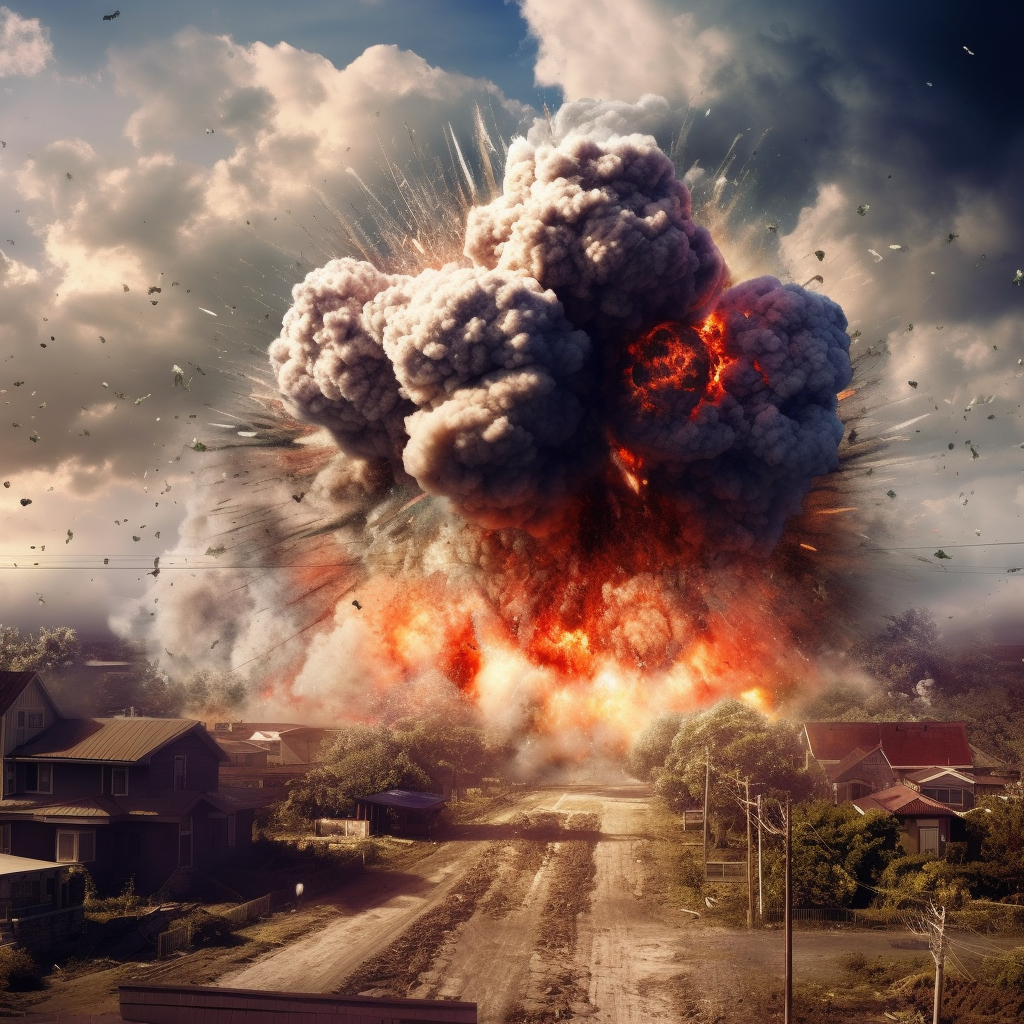Blast
Definition
Blast has multiple meanings depending on context. It can refer to a strong gust of wind, an explosion or loud noise, or an intense, forceful impact. As a verb, it means to cause an explosion, to make a loud sound, or to criticize harshly.
Parts of Speech
- Noun
- Verb
Pronunciation
American English
- IPA Pronunciation: /blæst/
- Respelling: blast
British English
- IPA Pronunciation: /blɑːst/
- Respelling: blahst
Etymology
The word "blast" originates from the Old English "blǣst," meaning "a blowing or a breath," related to the Old Norse word "blástr." It initially referred to wind or air pressure and evolved to include meanings related to explosions and loud impacts.
Derivatives
- Blasting (verb/noun)
- Blastoff (noun)
- Blaster (noun)
- Overblast (noun/verb)
- Blastproof (adjective)
Synonyms
- Explosion
- Gust
- Impact
Antonyms
- Calm
- Stillness
- Silence
Usage
The word "blast" is used in various contexts. As a noun, it often describes an explosive event or forceful impact, as in "The blast destroyed the building." It can also refer to a strong gust of wind, as in "A sudden blast of wind blew through the trees." As a verb, it can mean to cause an explosion or to strongly criticize, as in "The critics blasted the movie."
Related Terms
- Explosion: A violent expansion or bursting with noise.
- Detonation: The action of causing an explosive device to explode.
- Shockwave: A wave of pressure resulting from an explosion or impact.
Detailed Definitions
Noun
- A sudden, loud explosion or burst of energy: Refers to a forceful and often destructive release of energy.
- Example: "The bomb exploded with a powerful blast."
- A strong gust of wind: Describes a sudden, intense movement of air.
- Example: "A blast of cold air greeted them as they opened the door."
Verb
- To cause an explosion or loud noise: Refers to the act of triggering an explosive device or producing a loud sound.
- Example: "The construction crew blasted the rocks to clear the path."
- To criticize harshly: Used metaphorically to describe intense, negative feedback or critique.
- Example: "The critic blasted the new restaurant for poor service."
blast



🇨🇳 Mandarin
- 爆炸 (bàozhà): explosion, blast
- IPA Pronunciation: /paʊ˨˩˦.ʈʂa˥˥/
- English Respelling: bao-zha
- 疾风 (jífēng): blast of wind
- IPA Pronunciation: /t͡ɕi˥˥.fʊŋ˥/
- English Respelling: ji-feng
🇮🇳 Hindi
- विस्फोट (visphoṭ): explosion, blast
- IPA Pronunciation: /ʋɪspʰoːʈ/
- English Respelling: vis-phoṭ
- झोंका (jhōnkā): blast of wind
- IPA Pronunciation: /dʒʱoːnkaː/
- English Respelling: jhon-ka
🇪🇸 Spanish
- Explosión: explosion, blast
- IPA Pronunciation: /eksploˈsjon/
- English Respelling: eks-plo-syon
- Ráfaga: blast of wind
- IPA Pronunciation: /ˈrafaɣa/
- English Respelling: raf-a-ga
🇫🇷 French
- Explosion: explosion, blast
- IPA Pronunciation: /ɛksplozjɔ̃/
- English Respelling: eks-plo-zhawn
- Rafale: blast of wind
- IPA Pronunciation: /ʁafal/
- English Respelling: ra-fal
🇸🇦 Arabic (Modern Standard)
- انفجار (infijār): explosion, blast
- IPA Pronunciation: /infiʒaːr/
- English Respelling: in-fi-jar
- هبوب (habūb): blast of wind
- IPA Pronunciation: /haːbuːb/
- English Respelling: ha-boob
🇧🇩 Bengali
- বিস্ফোরণ (bisphōraṇ): explosion, blast
- IPA Pronunciation: /bisphoɹon/
- English Respelling: bis-pho-ron
- ঝড় (jhōṛ): blast of wind
- IPA Pronunciation: /dʒʱɔɽ/
- English Respelling: jhor
🇷🇺 Russian
- Взрыв (vzryv): explosion, blast
- IPA Pronunciation: /vzrɨf/
- English Respelling: vz-rif
- Порыв (poryv): blast of wind
- IPA Pronunciation: /pɐˈrɨf/
- English Respelling: po-rif
🇵🇹 Portuguese
- Explosão: explosion, blast
- IPA Pronunciation: /ɨʃpluˈzɐ̃w̃/
- English Respelling: ish-plo-zawn
- Rajada: blast of wind
- IPA Pronunciation: /ʁɐˈʒadɐ/
- English Respelling: ra-zha-da
🇮🇩 Indonesian
- Ledakan: explosion, blast
- IPA Pronunciation: /lədakan/
- English Respelling: le-da-kan
- Tiupan: blast of wind
- IPA Pronunciation: /tiʊpan/
- English Respelling: tiu-pan
🇩🇪 German
- Explosion: explosion, blast
- IPA Pronunciation: /ʔɛksploˈzi̯oːn/
- English Respelling: eks-plo-zee-on
- Windstoß: blast of wind
- IPA Pronunciation: /ˈvɪntʃtoːs/
- English Respelling: vint-shtos
🇯🇵 Japanese
- 爆発 (bakuhatsu): explosion, blast
- IPA Pronunciation: /bakuhat͡su/
- English Respelling: baku-hatsu
- 突風 (totsupū): blast of wind
- IPA Pronunciation: /to.tsɯβː/
- English Respelling: tot-su-pu
🇻🇳 Vietnamese
- Sự nổ: explosion, blast
- IPA Pronunciation: /sɨ̞̠ nɔ˧ˀ˨ʔ/
- English Respelling: su no
- Cơn gió: blast of wind
- IPA Pronunciation: /kən˧ˀ˦ jɔ˧ˀ˦/
- English Respelling: kon yo
🇰🇷 Korean
- 폭발 (pogbal): explosion, blast
- IPA Pronunciation: /pʰok̚.pʰal̚/
- English Respelling: pok-bal
- 돌풍 (dolpung): blast of wind
- IPA Pronunciation: /tol̚.pʰuŋ/
- English Respelling: dol-pung
🇹🇷 Turkish
- Patlama: explosion, blast
- IPA Pronunciation: /patˈlama/
- English Respelling: pat-lama
- Rüzgar güllesi: blast of wind
- IPA Pronunciation: /ˈɾyzɰaɾ ˈɟyllesi/
- English Respelling: ruz-gar gyul-lesi
🇵🇰 Urdu
- دھماکا (dhamākā): explosion, blast
- IPA Pronunciation: /d̪ʱəˈmaːkaː/
- English Respelling: dha-ma-ka
- آندھی (āndhī): blast of wind
- IPA Pronunciation: /ɑːnd̪ʱiː/
- English Respelling: aand-hi





